Understanding the waiting period for an immigration application is often the most stressful part of the journey to Canada. Immigration, Refugees and Citizenship Canada (IRCC) provides regularly updated processing times to offer applicants a projection of how long their file may take. This comprehensive breakdown offers a detailed look at the latest IRCC processing times as of early May 2024, providing invaluable insight for those navigating the complex Canadian immigration system.
Table of Contents
- Demystifying Temporary Residence Application Timelines (TRV, Study & Work Permits)A Deep Dive into Permanent Residence: Mapping Your Journey with IRCC Processing TimesThe Heart of Canadian Immigration: Family Sponsorship Processing DurationsThe Final Milestones: Citizenship and PR Card Processing InsightsKey Takeaways on IRCC Processing TimesFrequently Asked Questions
Demystifying Temporary Residence Application Timelines (TRV, Study & Work Permits)
Temporary residence pathways are the gateway to Canada for millions of visitors, students, and workers each year. Understanding the IRCC processing times for these applications is essential for proper planning. It is critical to distinguish between IRCC’s stated processing times and its service standards. A service standard is the department’s goal for processing an application, while the processing time reflects the historical reality—specifically, the time it took to process 80% of applications in the past. As of early May 2024, the timelines for key temporary residence applications are notable. For a Temporary Resident Visa (TRV), or visitor visa, applied for from outside Canada, the current average is 120 days. This figure can fluctuate significantly based on the applicant’s country of residence and the volume of applications at a specific visa office. Applicants should factor this substantial waiting period into their travel plans to avoid disappointment. For those already in Canada seeking to extend their stay as a visitor, the process is considerably faster, averaging 16 days for online applications.
Aspiring international students and foreign workers also face specific timelines. A study permit application from outside Canada is currently processed in about 10 weeks. This timeframe does not include the time required for biometrics, so applicants must complete that step promptly to avoid delays. Similarly, a work permit from outside Canada averages 15 weeks. These figures underscore the importance of applying well in advance of a school start date or a job offer’s commencement date. For those already in Canada, extensions are generally quicker. Extending a study permit or a work permit from within Canada through an online portal takes an average of 40 days and 96 days, respectively. The Super Visa, a popular option for parents and grandparents of Canadian citizens and permanent residents, has a processing time of 104 days for applications submitted from outside Canada. These timelines are dynamic and applicants are strongly encouraged to consult the official IRCC processing time calculator for the most current and country-specific information before submitting their application.
A Deep Dive into Permanent Residence: Mapping Your Journey with IRCC Processing Times
The journey to permanent residence (PR) is a significant life event, and the associated waiting periods are a major consideration for applicants. The IRCC processing times for economic immigration programs, which are designed to attract skilled workers who can contribute to Canada’s economy, vary by stream. The Express Entry system, Canada’s flagship application management system for skilled workers, shows relatively streamlined processing. As of the latest update, applications under the Canadian Experience Class (CEC) take an average of 5 months. The Federal Skilled Worker Program (FSWP) has a slightly longer timeline of 7 months. For those who have received a nomination through a Provincial Nominee Program (PNP) and applied via Express Entry, the processing time is also 5 months. It’s important to remember that this timeline begins only after an Invitation to Apply (ITA) has been received and a complete application has been submitted. The initial stage of creating an Express Entry profile and waiting in the pool for an ITA is not included in this calculation.
Beyond Express Entry, other economic pathways show more variation. The Atlantic Immigration Program (AIP), a dedicated stream for attracting skilled workers to Canada’s Atlantic provinces, currently has a processing time of 11 months. Applicants nominated directly by a province through a non-Express Entry aligned PNP stream face a longer wait of 13 months. The timelines for Quebec-selected skilled workers stand at 12 months. One of the longest waits is for the Federal Self-Employed Persons Program, which caters to individuals with relevant experience in cultural activities or athletics; this stream currently has an extensive processing time of 47 months. These figures highlight the strategic differences between various PR programs. While Express Entry offers a faster route for those who qualify, other programs, though slower, provide vital opportunities for candidates with specific regional or professional profiles. Prospective immigrants should carefully evaluate these IRCC processing times as part of their overall immigration strategy.
The Final Milestones: Citizenship and PR Card Processing Insights
For many permanent residents, obtaining Canadian citizenship is the ultimate goal of their immigration journey. The path to citizenship involves meeting residency and other requirements, and a final processing period for the application itself. As of early May 2024, the processing time for a citizenship grant is 16 months. This period covers the entire process from the moment IRCC receives the application to the moment the applicant attends their citizenship ceremony. This includes background checks, the citizenship test, and the final decision. This 16-month average is a significant commitment, and applicants should be prepared for this wait after they become eligible to apply. In addition to citizenship grants, IRCC also processes applications for proof of citizenship, also known as a citizenship certificate. This document is for individuals who are already Canadian citizens (e.g., by birth abroad to a Canadian parent) but need an official document to prove it. The current processing time for a citizenship certificate is 7 months.
Before reaching the citizenship stage, permanent residents must maintain their status, which often involves renewing their Permanent Resident (PR) card. The PR card is the official proof of status in Canada and is necessary for re-entry into the country when traveling abroad. The current IRCC processing time to renew or replace a PR card is 64 days. This is a relatively efficient timeframe, but it is still crucial for permanent residents to apply for renewal well before their card expires, especially if they have upcoming international travel plans. Applying for a new PR card for the first time after landing in Canada is a different process, as the first card is typically mailed automatically. However, issues with this initial card may require a separate application. Understanding these final processing steps is key to seamlessly transitioning from a permanent resident to a full Canadian citizen and maintaining the necessary documentation along the way.
Key Takeaways on IRCC Processing Times
- Processing Times are Historical Data: The times published by IRCC are not a live guarantee. They are based on how long it took to process 80% of similar applications in the past. Your application could be faster or slower.Service Standards vs. Processing Times: IRCC has internal service standards, which are its goals for processing. The publicly listed processing times reflect the actual historical performance, which may be longer than the service standard.Application Type is a Major Factor: As shown, timelines vary dramatically between temporary residence, permanent residence, and citizenship applications, and even further between specific streams within those categories (e.g., FSWP vs. Self-Employed).Location Matters: For many applications, particularly TRVs, the applicant’s country of residence and the specific visa office handling the file can significantly impact the processing duration.Completeness is Key: A complete and accurate application is the best way to avoid unnecessary delays. Any missing documents or information will almost certainly push your processing time beyond the average.Check the Official Tool: Always use IRCC’s official online processing time calculation tool for the most up-to-date and specific information before making any plans based on these timelines.
Frequently Asked Questions
How does IRCC calculate its processing times?IRCC calculates processing times based on the time it took to finalize 80% of applications in the past. This historical data provides a realistic, albeit backward-looking, estimate for new applicants. The time is measured from when a complete application is received until a final decision is made.What is the difference between an IRCC processing time and a service standard?
A service standard is IRCC’s internal goal or target for processing an application under normal circumstances. In contrast, a processing time is the actual average time that it has historically taken the department to process the majority of applications, which can be longer or shorter than the service standard goal.What are the current IRCC processing times for Express Entry programs?
As of early May 2024, the processing times for Express Entry streams are 5 months for the Canadian Experience Class (CEC) and Provincial Nominee Program (PNP) applications, and 7 months for the Federal Skilled Worker Program (FSWP).How long does it take to sponsor a spouse for permanent residence?
Sponsoring a spouse or common-law partner currently takes approximately 12 months for an inland application (applicant is in Canada) and 15 months for an outland application (applicant is outside Canada).What is the waiting period for a Canadian citizenship application?
The current average processing time for a citizenship grant application is 16 months. This timeline covers the entire process from submission of the application to the citizenship ceremony.
Talk to us to find out more. ->
The content above is not intended to provide legal advice or opinions of any kind and may not be used for professional or commercial purposes.







